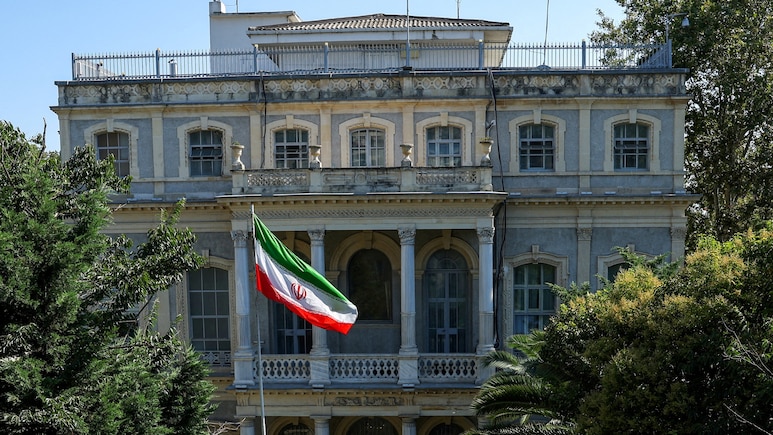
Britain, France and Germany have threatened to trigger a "snapback mechanism" to reintroduce UN sanctions over Tehran's atomic programme that were lifted under a now moribund 2015 Iran nuclear deal.
The trio -- known as the E3 -- is considering activating the mechanism unless Iran agrees to curb its nuclear programme and restore its cooperation with the International Atomic Energy Agency (IAEA).
Western powers and Israel have long accused Tehran of seeking to acquire nuclear weapons, a claim Iran denies.
AFP explains how the "snapback mechanism" works, as Tehran meets with European powers for talks in Geneva.
How does the 'snapback' mechanism work?
In 2015, the E3, together with the United States, China and Russia, signed a historic nuclear accord with Iran.
The deal, known officially as the Joint Comprehensive Plan of Action (JCPOA), saw the UN lift international sanctions against Iran in exchange for restrictions on Tehran's nuclear programme.
The agreement was unanimously ratified by the UN Security Council under resolution 2231.
Then-president Barack Obama's administration boasted of having obtained a clause in the agreement that would allow it to reimpose, or "snapback," all sanctions if Iran failed to comply with the agreement.
"It is a unique Security Council measure that has not been used before and once triggered, cannot be reversed," analyst Negar Mortazavi of the Center for International Policy told AFP.
Any state "participating" in the agreement can lodge a complaint with the Security Council if they deem another participant has significantly failed to respect the accord.
That notification starts a 30-day window where the Council must pass a new resolution that would officially lift the sanctions agreed to in resolution 2231.
If the participant that issues the initial complaint wishes instead to reinstate the sanctions, then it can veto the new resolution, thus automatically triggering the "snapback."
The window for activating the mechanism closes on October 18 -- after which the UN sanctions would be permanently removed -- but, according to the Financial Times, the Europeans have suggested pushing back that deadline.
Why do the European powers want to trigger it?
In a letter to the UN in mid-August, the E3 slammed Iran for having breached several JCPOA commitments, including building up a uranium stock to more than 40 times the permitted level under the deal.
"We are ready... to notify the significant non-performance of JCPOA commitments by Iran," and thus prepared to "trigger the snapback mechanism" before 31 August, the foreign ministers of France, Britain and Germany wrote in the letter.
By triggering the "snapback" provision by late August, the procedure would be completed before Russia, which has grown closer to Iran since its invasion of Ukraine in 2022, takes over the rotating council presidency in October.
The hard-won 2015 deal has been left in tatters ever since the US, during Donald Trump's first presidency, walked away from it in 2018, and reimposed sanctions on Iran.
Following the US withdrawal, Tehran gradually broke away from its commitments under the agreement and began stepping up its nuclear activities, with tensions high since the 12-day war between Iran and Israel in June.
The war also derailed Tehran's nuclear negotiations with the United States and prompted Iran to suspend cooperation with the IAEA, with inspectors of the Vienna-based UN body leaving the country shortly afterwards.
What does Iran say?
During his previous term, Trump attempted to trigger the snapback clause in 2020, but failed due to the country's unilateral withdrawal two years earlier.
While European powers have for years launched repeated efforts to revive the 2015 deal through negotiations and said they "have unambiguous legal grounds" to trigger the clause, Iran does not share their view.
"Tehran sees both the US and by extension Europe in violation of the 2015 deal, while Iran was still abiding by its terms," said Mortazavi.
From Iran's perspective, "the E3 unofficially abandoned it by halting business with Tehran in order to avoid US sanctions".
Moreover, Iran has threatened to withdraw from the Nuclear Non-Proliferation Treaty (NPT) if the "snapback" is triggered.
What impact would it have?
In concrete terms, the three European nations would reimpose "global embargoes on arms, nuclear equipment and banking restrictions that were lifted 10 years ago," said French Foreign Minister Jean-Noel Barrot.
Reinstated sanctions will have no "major impact on the Iranian economy, as the country is already among the most-sanctioned in the world," said Mortazavi.
But Tehran wants to avoid such a scenario, which would exacerbate its problems and isolate it even further on the international stage.
(This story has not been edited by NDTV staff and is auto-generated from a syndicated feed.)
Track Latest News Live on NDTV.com and get news updates from India and around the world

